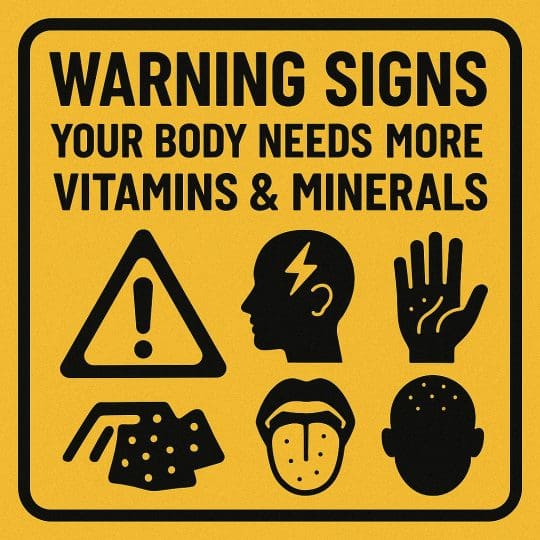
In our busy lives, it’s easy to ignore the small signals our body sends when something isn’t quite right. A deficiency in vitamins & minerals is one of the most common but often ignored issues. The powerful micronutrients play a major role in maintaining our health from boosting our immune system, maintaining metabolism, to keeping our skin, hair, and bones strong. When you don’t get enough of theses essential nutrients daily, your body begins to react negatively and shows warning signs. These signs might be minor initially such as feeling tired more often or getting colds easily. But if left unaddressed, they can develop into more serious health problems. Ensuring proper nutrition is vital whether you’re on a balanced eating plan or a restrictive keto diet plan. This article will look at the main symptoms that can indicate a deficiency and how dietary supplements or advice from a certified nutritionist can help you to get back on track.
Importance of Vitamins & Minerals:
vitamins & minerals are referred to as micronutrients because they are required in smaller amounts compared to macronutrients like carbohydrates, proteins and fats. However, they play a major role in maintaining health. They work as co-enzymes, boost immune function, support metabolism, and serve as antioxidants to fight against oxidative stress.
According to prominent nutritionists, essential nutrients deficiencies can manifest in subtle and not-so-subtle ways. The following are the most common warning signs that your body shows due to the low on vital vitamins, minerals, and other micronutrients.
- Persistent Fatigue and Low Energy:
If you’re feeling tired constantly even after a full night’s sleep, then this could be a indication of vitamin or mineral deficiency. Insufficient levels of vitamin B12, iron, or magnesium can significantly impact your metabolism, making you feel exhausted. Lack of these nutrients causes your energy production system to breakdown since they aid in the conversion of food into energy.
Daily nutritional supplementation may help you regain your energy, particularly if your diet is lacking because of food allergies or limits like the keto diet plan.
- Frequent Infections and Illnesses:
Your immune system may be weakened if you frequently get colds or infections because of low amounts of vitamins like zinc, vitamin C, and vitamin D. These micronutrients are essential for the development and maintenance of immune cells. Ensure you’re getting the recommended daily intake to maintain your defenses strong with the help of a nutritionist or a balanced diet plan vitamins & minerals.
- Mood Swings and Depression:
Did you know that the foods you eat have a big impact on your mood? Depressive symptoms and mood problems have been associated with low levels of vitamins B6, B12, and folate. These micronutrients aid in the production of the “feel-good” neurotransmitters, dopamine and serotonin. If you already struggle with emotional imbalances, a nutritionist can help you create a diet that will guarantee you obtain these vital nutrients.
- Bone Weakness and Pain:
Low vitamin D or calcium levels may be the cause of unexplained bone or muscle discomfort rather than aging. To keep bones strong and avoid diseases like osteoporosis, certain micronutrients are essential. Individuals who follow particular diets, such as the ketogenic diet, or have limited sun exposure may benefit from daily intake of dietary supplements to meet their requirements.
- Skin Issues Like Acne, Dryness or Rashes:
Your internal health is often reflected in your skin. A deficiency of vitamins A, C, E, and zinc may be associated with rashes, dry patches, and acne. By acting as antioxidants, these nutrients support the body’s defenses against oxidative damage and inflammation. If you’re on a limited eating plan, such as the keto diet, which may deprive you of some micronutrients, a nutritionist can suggest a personalized nutrition plan.

- Causes Of Micronutrients Deficiency:
A lack of vitamins & minerals can be caused by a number of factors. They are,
- Eating processed foods that are lacking in nutrients is considered a poor diet.
- Health issues such as celiac disease, which reduces the body’s ability to absorb nutrients.
- A few medications prevent the body from absorbing micronutrients.
- Dietary restrictions such as vegetarian, vegan, or ketogenic diets.
- The ability to absorb nutrition is generally reduced in older adults.
How to Treat Vitamins & Minerals Deficiency:
- Get tested first: Blood testing can assist in determining vitamin and mineral deficits so that you can take appropriate action.
- Consult a nutritionist: Depending on your dietary needs, health issues, and lifestyle, a qualified nutritionist can assist you in creating a well-balanced nutrition plan.
- Improve your diet: Increase your intake of whole grains, lean meats, fruits, veggies, and healthy fats. You can vary the micronutrients you consume even while following a ketogenic diet.
- Use dietary supplements properly: Although dietary supplements can be an effective way of covering nutritional gaps, a balanced diet should always be the foundation of a successful supplement routine. Look for high-quality brands and adhere to dosage guidelines.
Conclusion:
Your body is constantly communicating with you, and the warning signs of vitamin & mineral deficiencies are often your first indication that something is wrong with your nutrition. From persistent fatigue and frequent illness to brittle nails and skin issues, these symptoms are signals that your body needs more essential nutrients to function properly. Ignoring these signs can lead to long-term health issues. But the good news is that most deficiencies can be fixed with simple diet changes, lifestyle, or by including high-quality dietary supplements. It’s crucial to make sure you’re getting the right balance of micronutrients each day, regardless of your eating habits, whether you follow a typical diet or the more restricted keto diet plan. You may avoid nutrient gaps and customize your daily diet to fit your specific needs by consulting with a nutritionist. Prioritizing vitamins & minerals, and antioxidants and paying attention to your body’s needs will help you maintain your general health and well-being over time in addition to boosting your metabolism and immune system.


